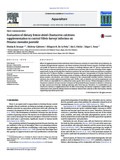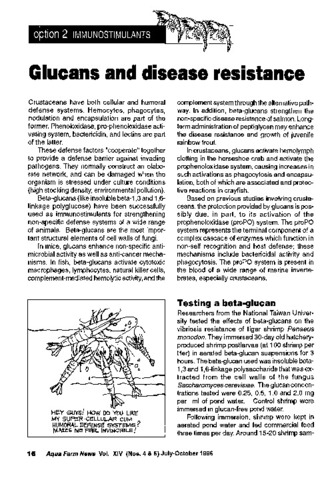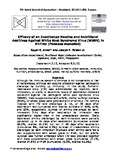| dc.contributor.author | Amar, Edgar C. | |
| dc.contributor.author | Faisan, Joseph P., Jr. | |
| dc.date.accessioned | 2015-04-10T09:59:52Z | |
| dc.date.available | 2015-04-10T09:59:52Z | |
| dc.date.issued | 2012 | |
| dc.identifier.citation | Amar, E. C., & Faisan Jr., J. P. (2012). Induction of immunity and resistance to white spot syndrome virus (WSSV) in shrimp Penaeus monodon (Fabricius) by synthetic oligodeoxynucleotide and bacterial DNA. Philippine Agricultural Scientist, 95(3), 267-277. | en |
| dc.identifier.issn | 0031-7454 | |
| dc.identifier.uri | http://hdl.handle.net/10862/2173 | |
| dc.description.abstract | Shrimps like all invertebrates are believed to lack true adaptive immunity but recent evidence indicate that they can be protected against pathogenic organisms by priming their immune system with immunostimulatory substances. Here, we describe results of investigation aimed to strengthen shrimp immunity as a preventive strategy against white spot syndrome virus (WSSV) infection. Oligodeoxynucleotides (ODNs) with and without Cytosine-Guanine (CpG) motifs, and Vibrio harveyi genomic DNA (VHD) were administered by intramuscular injection and shrimp responses were assessed by ex vivo assays and experimental infection trials. Results showed that CpG ODN significantly increased ex-vivo immunity indices such as total hemocyte count (THC), plasma agglutination titer (PAT) and hemocyte lysate agglutination titer (HLAT). VHD significantly increased immune indices such as THC, plasma total protein (PTP) and HLAT. Reverse (GpC) motifs increased THC only. At a lower viral challenge dose, both CpG and GpC motifs, and VHD, were able to reduce shrimp mortality significantly but only CpG and VHD did so at a higher challenge dose. Strengthening shrimp immunity by the use of immunostimulatory nucleotides and bacterial genomic DNA could be a feasible preventive approach in the management of WSSV infections in shrimp. | en |
| dc.description.sponsorship | This study was supported by research funds from SEAFDEC AQD and the Regional Fish Disease Project of the Government of Japan Trust Fund Phase 4 under Study Code 8001-T-FD-FH1204. | en |
| dc.language.iso | en | en |
| dc.publisher | University of the Philippines Los Baños | en |
| dc.subject | Penaeus monodon | en |
| dc.subject | Philippines | en |
| dc.title | Induction of immunity and resistance to white spot syndrome virus (WSSV) in shrimp Penaeus monodon (Fabricius) by synthetic oligodeoxynucleotide and bacterial DNA | en |
| dc.type | Article | en |
| dc.citation.volume | 95 | |
| dc.citation.issue | 3 | |
| dc.citation.spage | 267 | |
| dc.citation.epage | 277 | |
| dc.citation.journalTitle | Philippine Agricultural Scientist | en |
| dc.subject.asfa | symptoms | en |
| dc.subject.asfa | White spot syndrome virus | en |
| dc.subject.asfa | laboratory culture | en |
| dc.subject.asfa | shrimp culture | en |
| dc.subject.asfa | pathogenic bacteria | en |
| dc.subject.asfa | immunology | en |
| dc.subject.asfa | disease resistance | en |
| dc.subject.asfa | immunity | en |
| dc.subject.asfa | aquaculture | en |
| dc.subject.asfa | immunization | en |
| dc.subject.asfa | nucleotides | en |
| dc.subject.asfa | viral diseases | en |
| dc.subject.asfa | DNA | en |
| dc.subject.asfa | mortality causes | en |
| dc.subject.scientificName | Penaeus monodon | en |
| dc.subject.scientificName | Vibrio harveyi | en |



